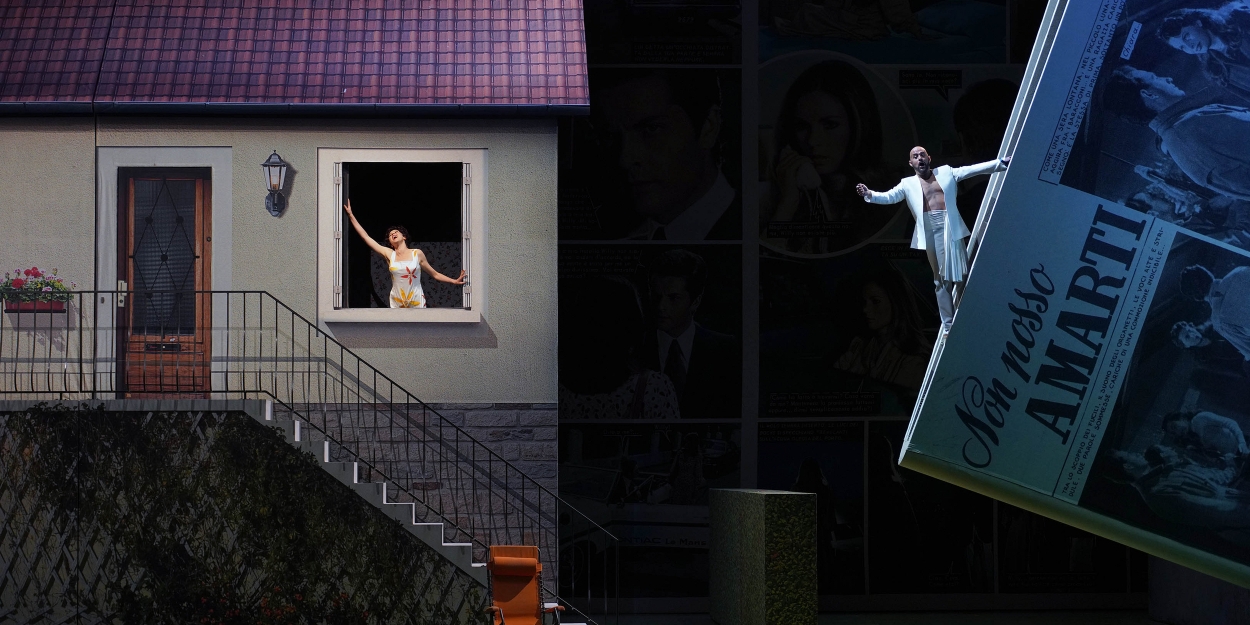Review: Madrid's Teatro Real Brings Out the Charms and Laughs of Rossini's TURCO IN ITALIA
Lively Laurent Pelly Production An Admirable Showcase for Soprano Lisette Oropesa

As I sat down to write about the delightful recent performance I heard of Rossini’s IL TURCO IN ITALIA at Madrid’s Teatro Real, with soprano Lisette Ororpesa in a charming new production by Laurence Pelly, I went to Spotify to see what kind of recordings were around. I was surprised to find more than a dozen of them--headlining everyone from Callas (in several of them) to Bartoli, with Sills, Jo, Caballe, Sciuti and some less familiar singers.
Why surprised? Because it’s certainly not near the top of anyone’s hit parade of Rossini operas, and I’m not sure it’s ever been done at the Met (though the old New York City Opera did it with Sills as Fiorilla). His major comic works, which include BARBIERE, CENERENTOLA and even L’ITALIANA, have been seen regularly; TURCO? Fuhgeddaboudit.
Well, the Met could do (and has done) much worse than taking on this imaginative, mid-century modern production by Pelly (who did the popular FILLE DU REGIMENT for it and a couple of other major houses) and collaborators designer Chantal Thomas with lighting by Joel Adam. (Pelly did the costumes himself.) It seemed a particularly good showcase for Oropesa in the lead, along with much of the cast I heard. (The house uses the “stagione” system, where one opera is done at a time, night after night, with alternating casts.)
To quote Sondheim, “Tragedy tomorrow, comedy tonight.” Pelly has a flair for staging comedy of this sort and also likes opera, clearly. He has set the show in the world of telenovelas, sort of a cross between a soap opera and a live-action comic book, with certain scenes, or snippets of scenes, framed as in the panels of a comic. He knows how to work in small details for maximum effect.
A poet with writer’s block, Prosdocimo (the lively baritone Florian Sempey), sits at his window, hunting and pecking at his typewriter, wearing a worn bathrobe for much of the evening, takes note of the bored housewife next door (Oropesa), with her older husband, and younger lover (who’s one of many who seem to have kept her going) and wonders how he can use them in a play. Then suddenly there are some newcomers in town: the Turco and Zaida, a gypsy who had once been involved with him and would like him back as soon as she sets eyes on him.
As they say, the plot thickens…
Oropesa had missed her first two performances of the run because of the flu, but she was in fine form at her first evening back, with impeccable coloratura and the comic chops that most of the opera calls for, and the heft for her regrets at the end. I don’t know how the others who had sung in her absence (her primary alternate, soprano Sara Blanch, and her alternate, Sabina Puertolas), but Oropesa--so familiar to Met audiences in more dramatic roles--was simply peachy, even though her character was not exactly sympathetic for much of the piece.
In the title role, Selim, bass-baritone Alex Esposito cut a swaggering figure (think Errol Flynn in his prime), sang with assurance and was catnip for Fiorilla, especially compared with the young and gaga Don Narciso (the light-voiced but sweet tenor,Edgardo Rocha). Though she thinks she’s going to have him to herself, she finds herself on competition with Zaida (very well portrayed and sung by mezzo Paola Gardina), causing all kinds of, well, you know, complications.
As Fiorilla’s husband, Don Geronimo baritone Misha Kiria, took a bit to grow on me (and the rest of the audience, I think), but by Act II, he’d found his sweet spot in the role; nonetheless I think it needed the kind of heft that a Bartolo from BARBIERE, might bring, though he did well by the Rossini patter.
The audience had a good view of the Real’s orchestra during the overture of the opera--nice kudo considering the work ahead of them, starting with the familiar-sounding, aggressive and very Rossinian overture under the Real’s music director, Giacomo Sagripanti and going through to the more intimate moments. (Also considering the gefuffle over Nathalie Stutzmann’s comments about the Met’s orchestra being in a “cave” during the new ZAUBERFLOTE’s run.) The chorus did well, both vocally and dramatically, under Andres Maspero.
This was my first visit to the Teatro Real and, with only 1800 seats (compared to the Met’s nearly 4000), seemed the perfect place to see an opera. I’ve often wondered how it might be if the Met were redesigned as a multi-plex for opera, to give optimum advantage to a variety of works, from the beginning of operatic history to today. After all, not every work needs to be showcased in a 4000-seat house, no matter how well it is produced.
Reader Reviews

Videos

